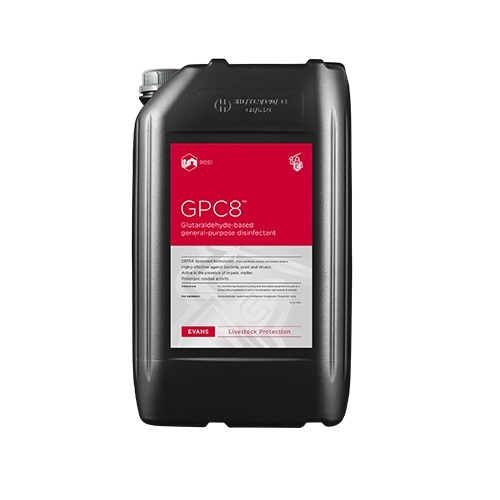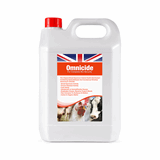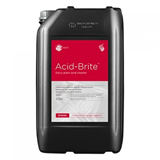GPC8 Glutaraldehyde
Sold in cases of 2x5ltr or 25ltr container
A powerful glutaraldehyde based disinfectant which is bactericidal, fungicidal & virucidal & offers protection from a wide range of disease causing microorganisms. It has been found to be effective against a wide range of organisms including the following:
Bacteria
Brachyspira hyodysenteriae, Bordetella bronchiseptica, Campylobacter jejuni, Corynebacterium pseudotuberculosis, Enterococcus faecalis, Escherichia coli, Haemophilus parasuis, Klebsiella pneumonia, Leptospira interrogans, Mycoplasma hyopneumoniae, Pasteurella multocida, Proteus vulgaris, Pseudomonas aeruginosa, Salmonella arizonae, Salmonella enteritidis, Salmonella gallinarum, Salmonella pullorum, Salmonella typhimurium, Staphylococcus aureus, Streptococcus suis.
Fungi
Candida albicans, Aspergillus brasiliensis (formerly niger).
Viruses
African Swine Fever, Aujesky’s Disease, Avian adenovirus, Avian influenza, Foot & Mouth Disease Virus, Hepatitis B & C, HIV, Infectious Bronchitis, Infectious Bursal Disease Virus, Infectious Laryngotracheitis, Marek’s Disease Virus, Parvovirus, Porcine Circovirus, Porcine Influenza (H1N1), Porcine Reproductive & Respiratory Syndrome (PRRS), Porcine Rotavirus, Swine Fever.
Features & Benefits
- DEFRA Approved (Foot & Mouth and General Orders), Glutaraldehyde formulation
- Highly effective against bacteria, viruses and fungi
- Non-staining and active in the presence of organic matter
- Prolonged residual activity
User Instructions
General Sanitising
When using in livestock housing remove all portable equipment, litter & manure. If necessary clean using a detergent such as Evans Shift. Apply GPC8 ensuring all surfaces are covered. Allow the area to dry if possible before replacing equipment, etc., & restocking. Dilute 1:50/190 parts water depending on soilage &/or disease history of the housing.
Drinking Water Systems
The water systems in livestock housing should be drained, flushed with clean water followed by flushing with GPC8 at 1:190. All traces of disinfectant should be removed with clean water when disinfection is complete.
Disease Control
Approved by DEFRA for the purposes of Diseases of Animals (Approved Disinfectants) Order 1978 (as amended), at the following dilutions:-
- Foot & Mouth Disease 1:80
- General Use 1:35
Bird Flu has recently been brought back up in the UK media, so it is useful to share some information about the epidemiology of the virus, how to contain it, chemicals to use and share some common sense information on prevention of the spread if you are unfortunate enough to get it in your flock.
The virus spreads through infected birds shedding the virus in their saliva, nasal secretions and droppings. Healthy birds get infected when they come into contact with contaminated secretions of feces from infected birds. In very rare cases it can affect humans, however there are many strains of bird flu virus and most of them will not infect the human population. In recent years there are four strains that have caused concern in the human population:
- H5N1 (since 1997)
- H7N9 (since 2013)
- H5N6 (since 2014)
- H5N8 (since 2016)
Although these four strains don’t affect humans easily, nor commonly and they aren’t spread from human to human; several people have been infected around the world. No humans have been infected with H5N1, H7N9, H5N6 or H5N8 bird flu in the UK – this includes the type of H5N6 virus recently found in humans in China.
H5N8 bird flu has been found in some wild birds and poultry in the UK. H5N6 has also been found in some wild birds in the UK but is a different strain to that seen in China.
You can find the latest situation on newly reported cases and guidance on the Government website https://www.gov.uk/guidance/avian-influenza-bird-flu#latest-situation.
Bird Flu is spread by close contact with an infected bird (dead or alive), and can be contracted by touching infected birds; touching droppings or bedding and killing infected poultry for cooking.
You cannot catch bird flu through eating infected poultry or eggs if they have been thoroughly cooked.
If you keep poultry, whether in your garden or commercially on a farm, it is important that you keep a close eye on them; maintain good bio security. During the winter months there is a higher risk of contamination from migrating wild birds, so it is particularly important to watch out for any symptoms in your birds.
Bird flu is a notifiable animal disease. If you suspect any type of bird flu in poultry you must report it immediately by calling the Defra Rural Services Helpline on 03000 200 301. In Wales, contact 0300 303 8268. In Scotland, contact your local Field Services Office. Failure to do so is an offence.
Good biosecurity improves the overall health and productivity of your flock by helping keep out poultry diseases such as avian influenza and limiting the spread of disease in an outbreak.
This applies just as much if you only have a few birds as pets, or if you have a large commercial flock. An outbreak of bird flu in back garden chickens results in the same restrictions on movement of birds. It has the same effect on farmers and trade in poultry as an outbreak on a commercial farm.
To ensure good biosecurity, all poultry keepers should:
- minimise movement in and out of bird enclosures
- clean footwear before and after visiting birds, using a Defra approved disinfectantat entrances and exits
- clean and disinfect vehicles and equipment that have come into contact with poultry
- keep areas where birds live clean and tidy, and regularly disinfect hard surfaces such as paths and walkways
- humanely control rats and mice
- place birds’ food and water in fully enclosed areas protected from wild birds, and remove any spilled feed regularly
- avoid keeping ducks and geese with other poultry species, where possible
- keep birds separate from wildlife and wild waterfowl by putting suitable fencing around outdoor areas they access
- keep a close watch on birds for any signs of disease and report any very sick birds or unexplained deaths to your vet
Biosecurity is the prevention of disease causing agents entering or leaving any place where they can pose a risk to farm animals, other animals, humans, or the safety and quality of a food product.
Good biosecurity should be practised at all times, not just during a disease outbreak. Taking the right measures in the early stages of an outbreak e.g. before we know disease is in the country, can help prevent or reduce its spread.
In terms of chemicals we provide to help with good preventative and chemicals that will help during an outbreak, you can find them here. All chemicals we supply in this section are DEFRA approved.
Omnicide is a great all rounder, and is effective in very small amounts against a broad spectrum of viruses including Bird Flu, Swine Disease etc. We also offer Fam 30 which is another highly effective chemical and GCP8 and Vanodox. We regularly stock all four of these chemicals, so if you have an outbreak you can contact us for 24 hour delivery, or just use a good Bio Security Chemical as part of your Bio Security Practices.
DEFRA and the UK government are basically recommending common sense actions to ensure you and your family are kept safe and well. Wash your hands well and often with any soap and water, or you could get an anti-microbial soap which will kill the virus for certain – such as GOJO ANTI-MICROBIAL SOAP, or WHITE BACTERICIDAL SOAP. It might be useful to have a read over my Soap without sanitisers and soap with sanitisers blog again to refresh your memory.
For those of us out there who don’t keep birds as pets or commercially farm birds, we remain at a very low risk, and contraction of bird flu is very rare. For those who do keep birds for commercial farming and or as pets, good bio security is essential, make sure you wash your boots, protect your birds when they are outside, disinfect your vehicles, take extra precautions by wearing PPE (googles, gloves, aprons) when dealing with a suspicious bird death, and use your common sense.
Separate your bird species, and I can’t stress this enough make sure your bio security is up to the job if Bird Flu is transmitted to your area and you are keeping birds in a high risk area. It is better to set up protocol and get everyone following it, when you are not under pressure and when your flock is not at risk that to try and set up protocol when tensions are high and everyone is stressed. Lay the foundations now, to keep your flock safe.











